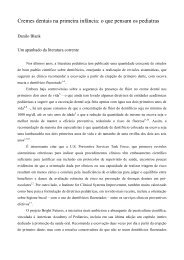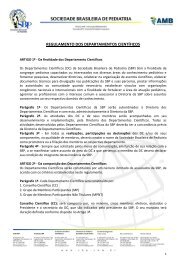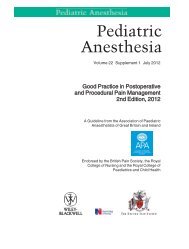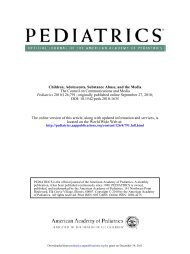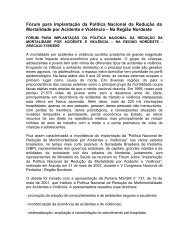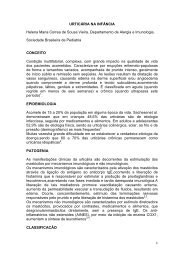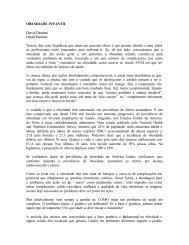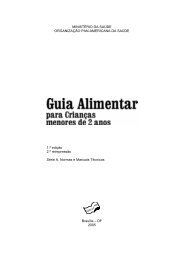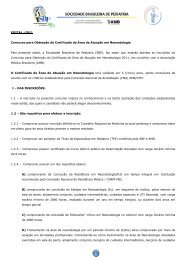The differential diagnosis of hypernatraemia in children, with ...
The differential diagnosis of hypernatraemia in children, with ...
The differential diagnosis of hypernatraemia in children, with ...
You also want an ePaper? Increase the reach of your titles
YUMPU automatically turns print PDFs into web optimized ePapers that Google loves.
<strong>The</strong> Diagnosis <strong>of</strong> Salt Poison<strong>in</strong>g Lead<strong>in</strong>g to Hypematraemia <strong>in</strong> Children – September 2009<br />
A study from Southampton 214 used 24-hour ur<strong>in</strong>ary sodium excretion as a marker <strong>of</strong><br />
<strong>in</strong>take <strong>in</strong> 28 <strong>children</strong> aged 3 to 5 years registered <strong>with</strong> a s<strong>in</strong>gle general practice. <strong>The</strong>ir<br />
sodium <strong>in</strong>take was also estimated by analysis <strong>of</strong> 3-day food diaries. <strong>The</strong> average<br />
daily excretion <strong>of</strong> sodium was 65 mmol, or 3.5 mmol/kg (range 28 to 105 mmol,<br />
or 1.6 to 6.2 mmol/kg). Analysis <strong>of</strong> the food diaries suggested a mean daily sodium<br />
<strong>in</strong>take <strong>of</strong> 69 mmol (range 32 to 98 mmol).<br />
A second study from London 215 obta<strong>in</strong>ed two 24-hour ur<strong>in</strong>e samples from 34<br />
<strong>children</strong> aged 4 to 6 years attend<strong>in</strong>g two primary schools. <strong>The</strong> mean ur<strong>in</strong>ary<br />
sodium excretion was 64 mmol (range 20.5 to 131 mmol). Neither study calculated<br />
fractional sodium excretion rates.<br />
A study from the Netherlands <strong>in</strong> 1980 <strong>in</strong>vestigated the relationship between<br />
blood pressure and the concentration <strong>of</strong> sodium <strong>in</strong> dr<strong>in</strong>k<strong>in</strong>g water. 296 348 healthy<br />
school<strong>children</strong> aged between 7 and 11 years <strong>of</strong> age were studied. Only 24-hour ur<strong>in</strong>e<br />
samples <strong>with</strong> a creat<strong>in</strong><strong>in</strong>e content <strong>of</strong> more than 0.16 mmol per kg body weight were<br />
analysed, and 14 <strong>children</strong> were excluded from analysis. 24 hour ur<strong>in</strong>ary sodiums<br />
were expressed as mmol/24 hours, i.e. not expressed per body weight; unfortunately,<br />
the results were expressed as means but it was not stated whether these were<br />
accompanied by standard deviations or standard errors. Sodium excretion was found<br />
to be slightly higher <strong>in</strong> <strong>children</strong> hav<strong>in</strong>g a lower sodium content <strong>in</strong> their dr<strong>in</strong>k<strong>in</strong>g<br />
water. Divid<strong>in</strong>g the mean sodium excretion by the mean weights <strong>of</strong> the three groups<br />
suggested 24-hour ur<strong>in</strong>ary sodium excretions <strong>of</strong> 3.3, 2.8 and 3.1 mmol/kg per day (<strong>in</strong><br />
the long term low, short term high and long term high dr<strong>in</strong>k<strong>in</strong>g water sodium groups<br />
respectively).<br />
A further study from the Netherlands 297 found a mean sodium excretion rate<br />
<strong>of</strong> 135.6 mmol/24 hours <strong>in</strong> 233 healthy <strong>children</strong> aged between 6 and 17 years.<br />
Divid<strong>in</strong>g the mean sodium excretion by the mean weight <strong>of</strong> the <strong>children</strong> suggested<br />
a mean 24 hour ur<strong>in</strong>ary sodium excretion <strong>of</strong> 2.8 mmol/kg per day.<br />
A cross sectional epidemiological study <strong>in</strong> Spanish school<strong>children</strong> aged 6 to 14<br />
years <strong>in</strong>vestigated the relationship between 24 hour ur<strong>in</strong>ary excretion and blood<br />
pressure. 298 553 <strong>children</strong> had a 24-hour ur<strong>in</strong>ary sodium measured. This was<br />
expressed as mEq/24 hours. Divid<strong>in</strong>g the mean sodium excretion by the mean<br />
weight <strong>of</strong> the <strong>children</strong> suggested a 24-hour ur<strong>in</strong>ary sodium excretion <strong>of</strong> 3.3 mEq/<br />
kg per day.<br />
84



